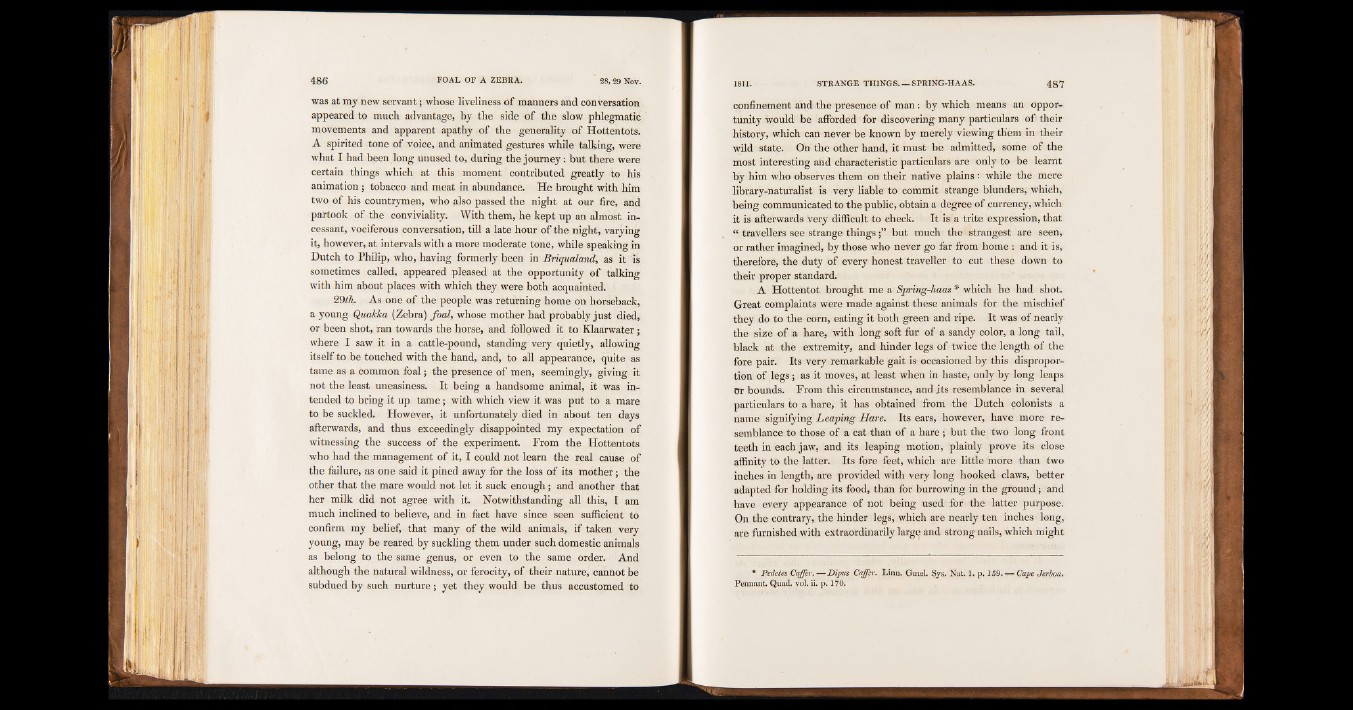
was at my new servant; whose liveliness of manners and conversation
appeared to much advantage, by the side of the slow phlegmatic
movements and apparent apathy of the generality of Hottentots.
A spirited tone of voice, and animated gestures while talking, were
what I had been long unused to, during the journey: but there were
certain things which at this moment contributed greatly to his
animation ; tobacco and meat in abundance. He brought with him
two of his countrymen, who also passed the night at our fire, and
partook of the conviviality. With them, he kept up an almost incessant,
vociferous conversation, till a late hour of the night, varying
it, however, at intervals with a more moderate tone, while speaking in
Dutch to Philip, who, having formerly been in Briqualand, as it is
sometimes called, appeared pleased at the opportunity of talking
with him about places with which they were both acquainted.
29th,. As one of the people was returning home on horseback,
a young Quakka (Zebra) foal, whose mother had probably just died,
or been shot, ran towards the horse, and followed it to Klaarwater ;
where I saw it in a cattle-pound, standing very quietly, allowing
itself to be touched with the hand, and, to all appearance, quite as
tame as a common foal; the presence of men, seemingly, giving it
not the least uneasiness. It being a handsome animal, it was intended
to bring it up tame; with which view it was put to a mare
to be suckled. However, it unfortunately died in about ten days
afterwards, and thus exceedingly disappointed my expectation of
witnessing the success of the experiment. From the Hottentots
who had the management of it, I could not learn the real cause of
the failure, as one said it pined away for the loss of its mother; the
other that the mare would not let it suck enough; and another that
her milk did not agree with it. Notwithstanding all this, I am
much inclined to believe, and in fact have since seen sufficient to
confirm my belief, that many of the wild animals, if taken very
young, may be reared by suckling them under such domestic animals
as belong to the same genus, or even to the same order. And
although the natural wildness, or ferocity, of their nature, cannot be
subdued by such nurture; yet they would be thus accustomed to
confinement and the presence of man: by which means an opportunity
would be afforded for discovering many particulars of their
history, which can never be known by merely viewing them in their
wild state. On the other hand, it must be admitted, some of the
most interesting and characteristic particulars are only to be learnt
by him who observes them on their native plains : while the mere
library-naturalist is very liable to commit strange blunders, which,
being communicated to the public, obtain a degree of currency, which
it is afterwards very difficult to check. It is a trite expression, that
“ travellers see strange t h i n g s b u t much the strangest are seen,
or rather imagined, by those who never go far from home : and it is,
therefore, the duty of every honest traveller to cut these down to
their proper standard.
A Hottentot brought me a Spring-haas * which he had shot.
Great complaints were made against these animals for the mischief
they do to the corn, eating it both green and ripe. It was of nearly
the size of a hare, with long soft fur of a sandy color, a long tail,
black at the extremity, and hinder legs of twice the length of the
fore pair. Its very remarkable gait is occasioned by this disproportion
of legs ; as it moves, at least when in haste, only by long leaps
Br bounds. From this circumstance, and its resemblance in several
particulars to a hare, it has obtained from the Dutch colonists a
name signifying -Leaping Hare. Its ears, however, have more resemblance
to those of a cat than of a hare; but the two long front
teeth in each jaw, and its leaping motion, plainly prove its close
affinity to the latter. Its fore feet, which are little more than two
inches in length, are provided with very long hooked claws, better
adapted for holding its food, than for burrowing in the ground; and
have every appearance of not being used for the latter purpose.
On the contrary, the hinder legs, which are nearly ten inches long,
are furnished with extraordinarily large and strong nails, which might
* Pedetes Coffer. — Dipus Coffer. Linn. Gmel. Sys. Nat. 1. p. 159.— Cape Jerboa.
Pennant. Quad. vol. ii. p. 170.